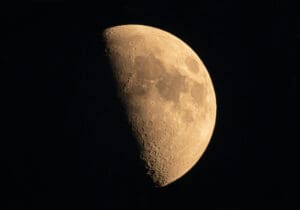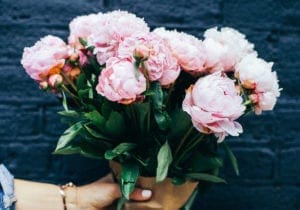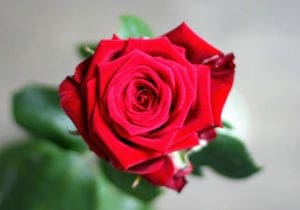
Le rose sono uno degli elementi più belli ed eleganti che la natura ci la natura ci ha dato. Questi fiori sono conosciuti universalmente come simbolo dell’amore, della bellezza e della perfezione.
Nella mitologia greca, la rosa era il fiore collegato a Venere, diventando uno dei segni più caratteristici. Nella storia della letteratura è il fiore che più di tutti ha ispirato componimenti poetici, ma anche numerosi aforismi e citazioni.
Ecco quindi una selezione delle più belle frasi sulle rose (in inglese e italiano) che ne sottolineano l’incredibile grazia. Scoprile subito!
Aforismi, citazioni e frasi sulle rose in inglese (con traduzione)
- What’s in a name? That which we call a rose by any other name would smell as sweet.
Cosa c’è in un nome? Ciò che chiamiamo rosa anche con un altro nome conserva sempre il suo profumo.
(William Shakespeare) 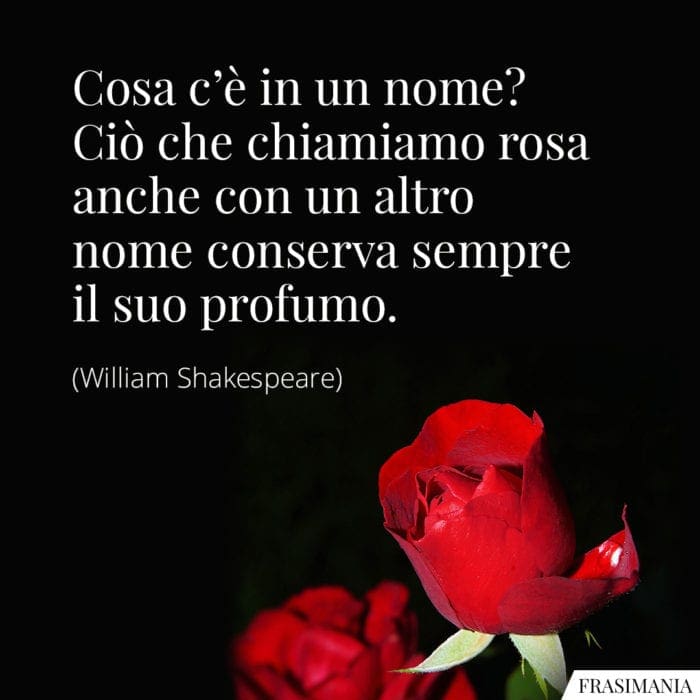
- We can complain because rose bushes have thorns, or rejoice because thorns have roses.
Possiamo lamentarci perché cespugli di rose hanno le spine, o gioire perché cespugli spinosi hanno le rose.
(Alphonse Karr) - It is the time you have wasted for your rose that makes your rose so important.
È il tempo che hai perduto per la tua rosa che ha reso la tua rosa così importante.
(Antoine de Saint-Exupéry) 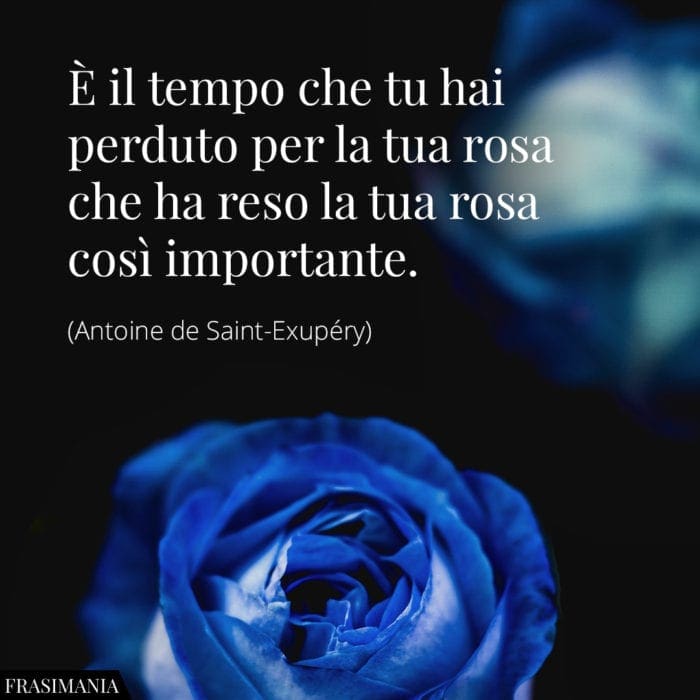
- The rose is without ’why’; it blooms simply because it blooms. It pays no attention to itself, nor does it ask whether anyone sees it.
La rosa è senza perché, fiorisce perché fiorisce; non pensa a sé, non si chiede se la si veda oppure no.
(Angelus Silesius) - Rose is a rose is a rose is a rose.
Una rosa, è una rosa, è una rosa.
(Gertrude Stein) - It will never rain roses: when we want to have more roses we must plant more roses.
Non pioveranno mai rose: quando vogliamo avere più rose dobbiamo piantare più rose.
(George Eliot) 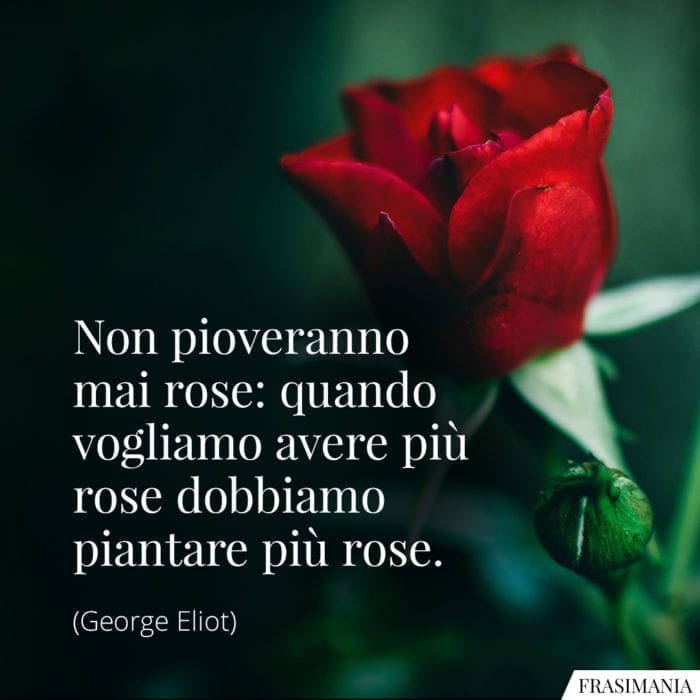
- Life is full of paradoxes, as roses are of thorns.
La vita è piena di paradossi, come le rose sono piene di spine.
(Fernando Pessoa) - We can complain because rose bushes have thorns, or rejoice because thorns have roses.
Possiamo lamentarci perché i cespugli di rose hanno le spine o gioire perché i cespugli spinosi hanno le rose.
(Alphonse Karr) 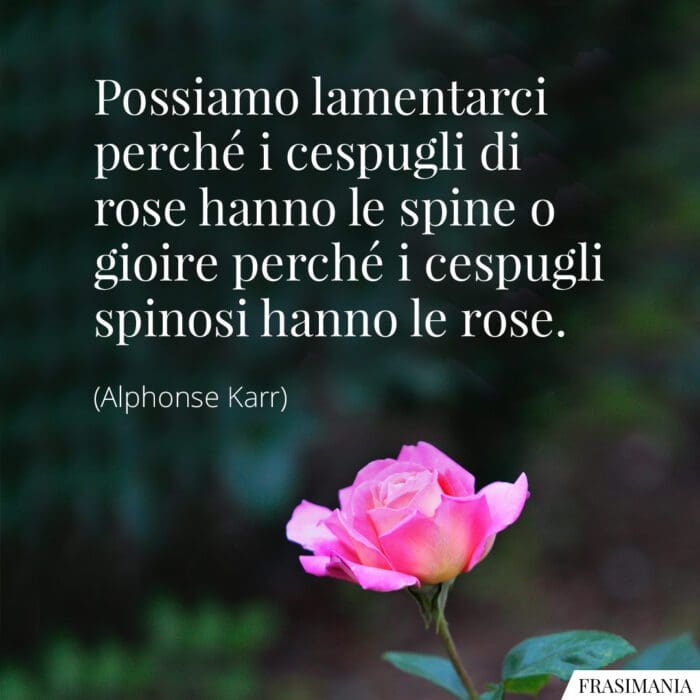
- I, love, I am the pure acetylene virgin attended by roses.
Io, amore, io sono una pura vergine d’acetilene con una scorta di rose.
(Sylvia Plath) - But he who dares not grasp the thorn should never crave the rose.
Chi non osa afferrare le spine non dovrebbe mai desiderare la rosa.
(Anne Brontë) 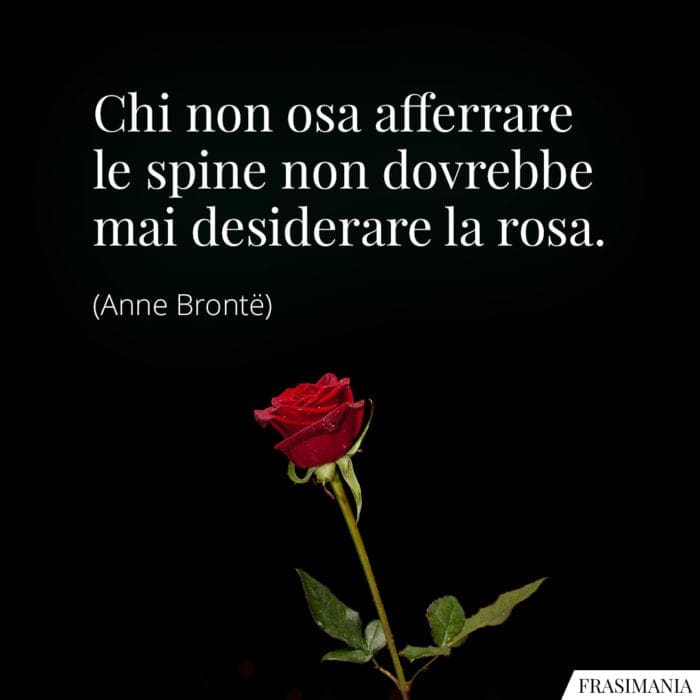
- The fragrance always stays in the hand that gives the rose.
La fragranza sta sempre nella mano che porge la rosa.
(George William Curtis) - Love thou rose, yet leave it on its stem.
Ama la rosa, ma lasciala sul suo gambo.
(Edward Bulwer-Lytton) - Thank you for the roses, thank you also for the thorns. Life is not a perpetual party.
Grazie per le rose, grazie anche per le spine. La vita non è una festa perenne.
(Jean d’Ormesson) 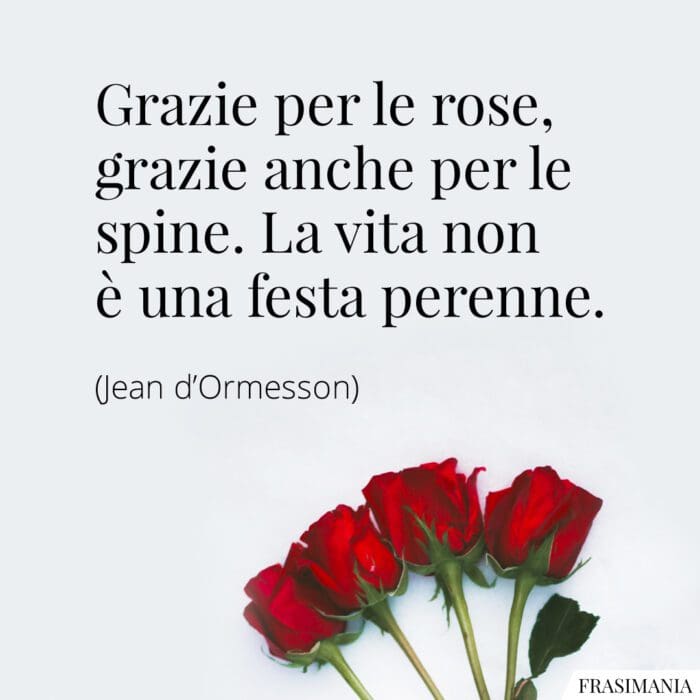
- You’re beautiful, but you’re empty…One couldn’t die for you. Of course, an ordinary passerby would think my rose looked just like you. But my rose, all on her own, is more important than all of you together, since she’s the one I’ve watered. Since she’s the one I put under glass, since she’s the one I sheltered behind the screen. Since she’s the one for whom I killed the caterpillars (except the two or three butterflies). Since she’s the one I listened to when she complained, or when she boasted, or even sometimes when she said nothing at all. Since she’s my rose.
Siete belle ma vuote – aggiunse. – Non si può dare la vita per voi. Di certo, un passante qualsiasi penserebbe che voi siete simili. Ma lei da sola è più importante di tutte voi altre insieme, perché è lei che ho innaffiato. Perché è lei che ho protetto con un paravento. Perché erano su di lei i bruchi che ho ucciso (salvo i due o tre che ho tenuto per le farfalle). Perché è lei che ho ascoltato lagnarsi o vantarsi, o anche qualche volta tacere. Perché è la mia rosa.
(Antoine de Saint-Exupéry) - Love is a rose, every petal an illusion, every thorn a reality.
L’amore è una rosa, ogni petalo un’illusione, ogni spina una realtà.
(Charles Baudelaire) 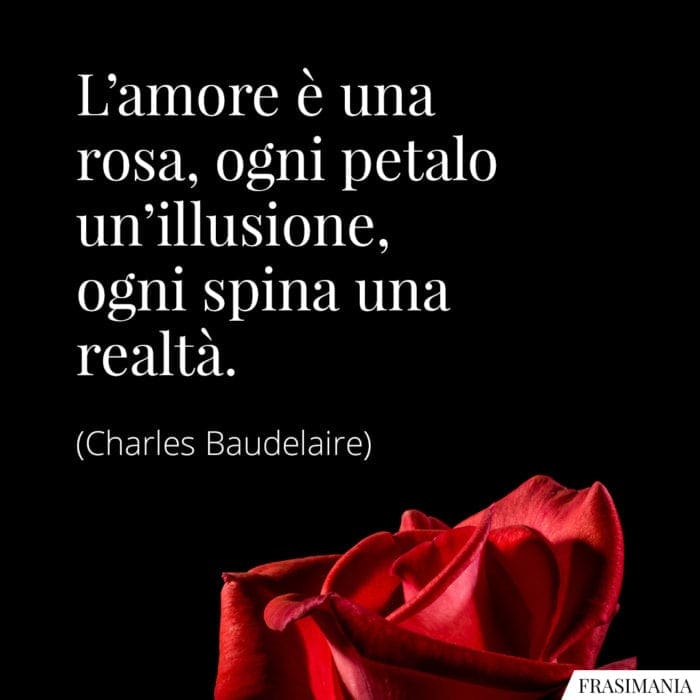
- Better to take pleasure in a rose than to put its root under a microscope.
È meglio godersi una rosa che esaminarne la radice sotto un microscopio.
(Oscar Wilde) - The voice of your eyes is deeper than all roses.
La voce dei tuoi occhi è più profonda di tutte le rose.
(E. E. Cummings) 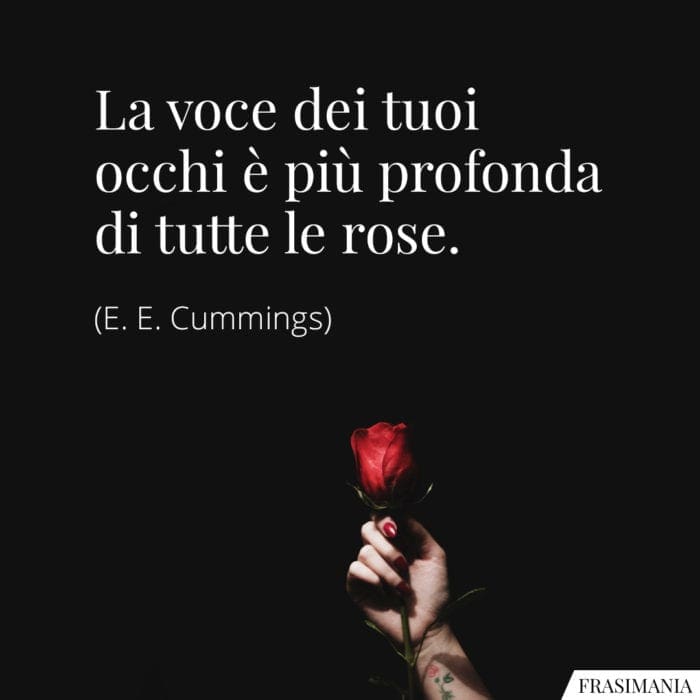
- She who loves roses must be patient and not cry out when she is pierced by thorns.
Lei che ama le rose deve essere paziente e non piangere quando viene trafitta dalle spine.
(Saffo) - I will soothe you and heal you, I will bring you roses. I too have been covered with thorns.
Ti curerò e ti guarirò, ti porterò delle rose. Anch’io sono stato coperto di spine.
(Gialal al-Din Rumi) - No rose without a thorn but many a thorn without a rose.
Non c’è rosa senza spine. Ma vi sono parecchie spine senza rose.
(Arthur Schopenhauer) 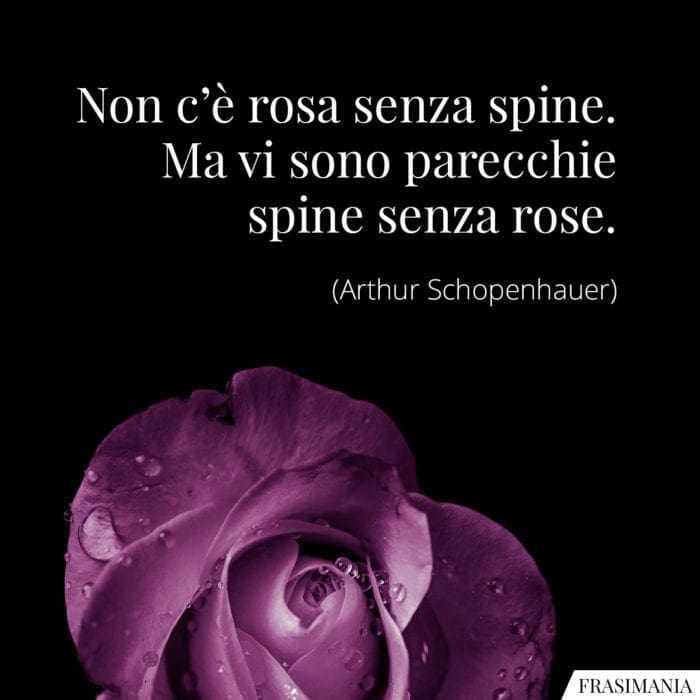
- No time to grieve for roses when the forests are burning.
Non c’è tempo per affliggersi per le rose quando le foreste stanno bruciando.
(Juliusz Słowacki) - Of all the flowers, me thinks a rose is best.
Tra tutti i fiori, penso che la rosa sia il migliore.
(William Shakespeare) - A single rose can be my garden; a single friend, my world.
Una sola rosa può essere il mio giardino. Un solo amico, il mio mondo.
(Leo Buscaglia) 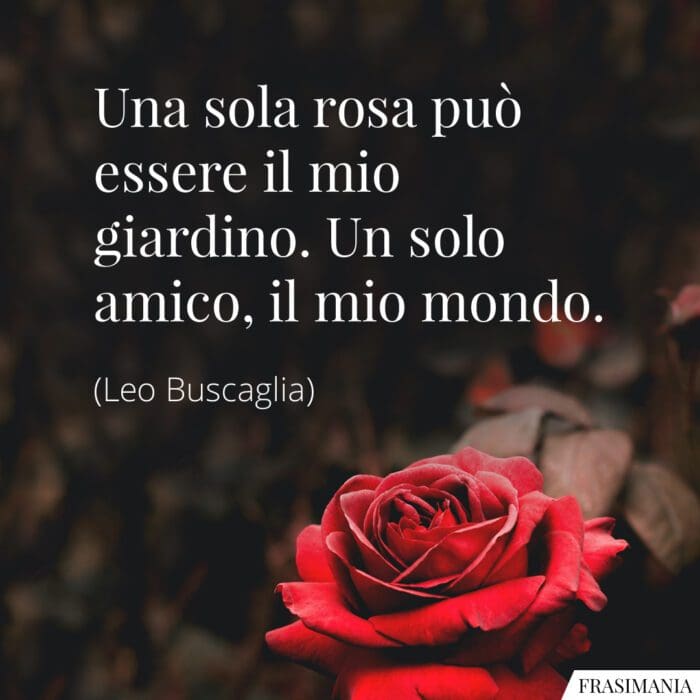
- Someday you will name me, then gently place those burning holy roses in my hair.
Un giorno mi nominerai, poi metterai delicatamente quelle rose ardenti nei miei capelli.
(Rainer Maria Rilke) - The snows and the roses of yesterday are vanished; And what is love but a rose that fades?
Le nevi e le rose di ieri sono svanite; e che cos’è l’amore se non una rosa che impallidisce?
(Edgar Lee Masters) 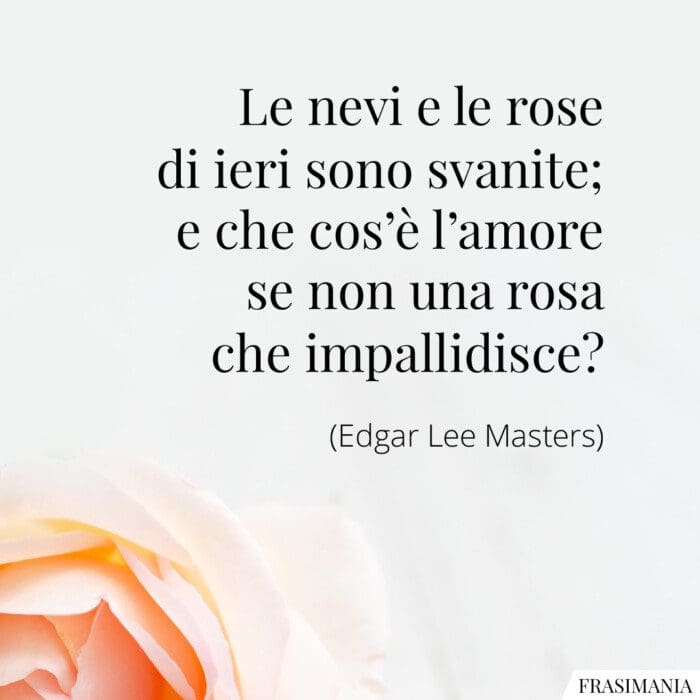
- Now and then it is a joy to have one’s table red with wine and roses.
Ogni tanto, certo, è una gioia avere la propria tavola rossa di vino e di rose.
(Oscar Wilde) - Gather the rose of love whilst yet is time.
Raccogli la rosa dell’amore finché sei ancora in tempo.
(Edmund Spenser) - He who wants a rose must respect her thorn.
Chi vuole una rosa deve rispettarne le spine.
(André Gide) 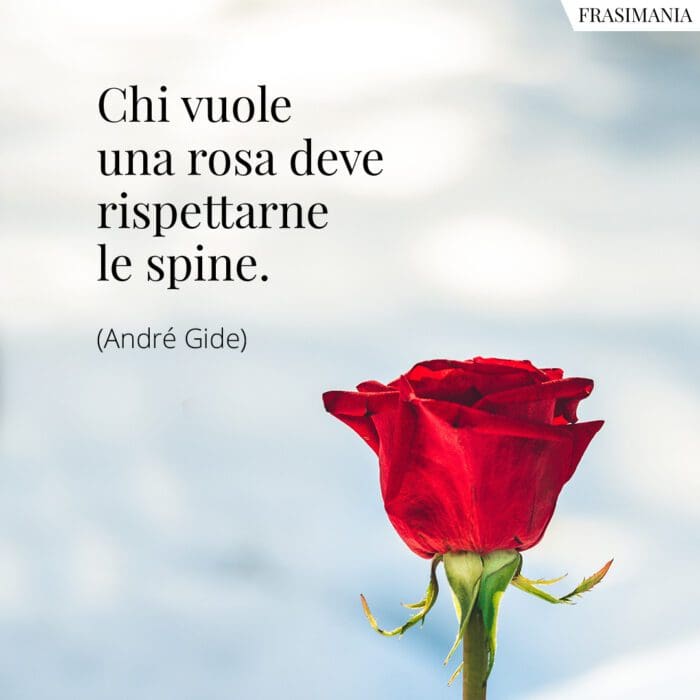
- The rose and the thorn, and sorrow and gladness are linked together.
La rosa e la spina, come il dolore e la gioia, sono collegati tra loro.
(Saʿdi) - My roses are my jewels; the sun, moon, and stars my clocks; fruit and water my fare.
Le mie rose sono i miei gioielli; il sole, la luna e le stelle i miei orologi; la frutta e l’acqua il mio cibo.
(Esther Stanhope) 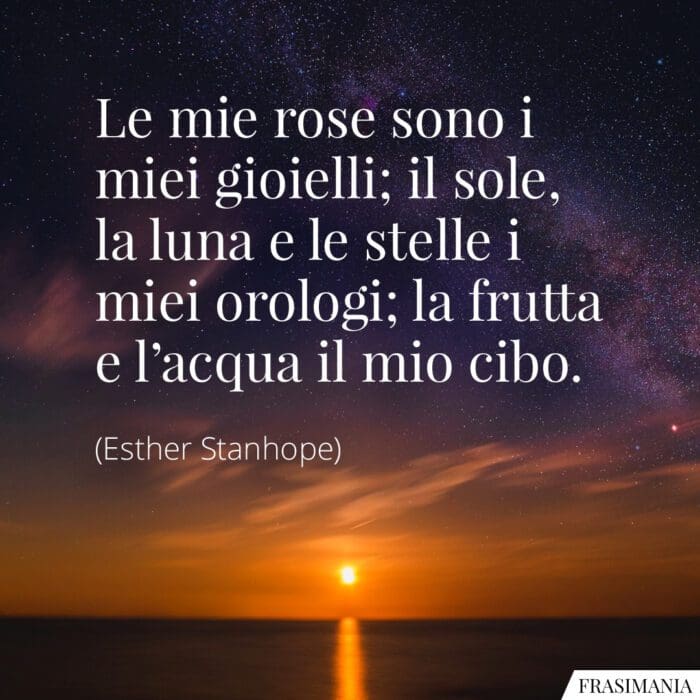
- Love planted a rose, and the world turned sweet.
L’amore ha piantato una rosa, e il mondo è diventato dolce.
(Katharine Lee Bates) - Life is a rose where each petal is an illusion and every thorn a reality.
La vita è una rosa dove ogni petalo è un’illusione ed ogni spina una realtà.
(Alfred De Musset) 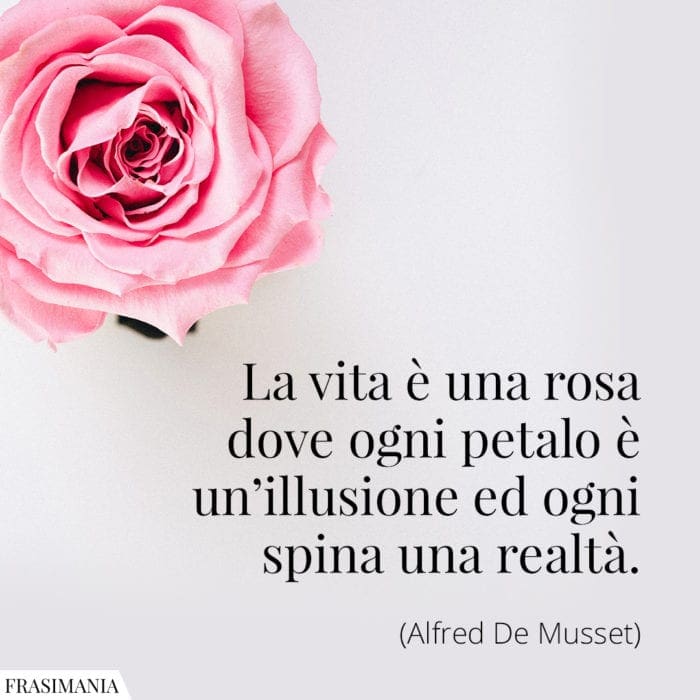
- The rose that lives its little hour is prized beyond the sculpted flower.
La rosa che vive la sua piccola ora è più apprezzata del fiore scolpito.
(William Cullen Bryant) - There were crimson roses on the bench; they looked like splashes of blood.
C’erano rose rosse sulla panca; sembravano schizzi di sangue.
(Dorothy L. Sayers) - I’d rather have roses on my table than diamonds on my neck.
Preferirei avere rose sul mio tavolo che diamanti attorno al collo.
(Emma Goldman) 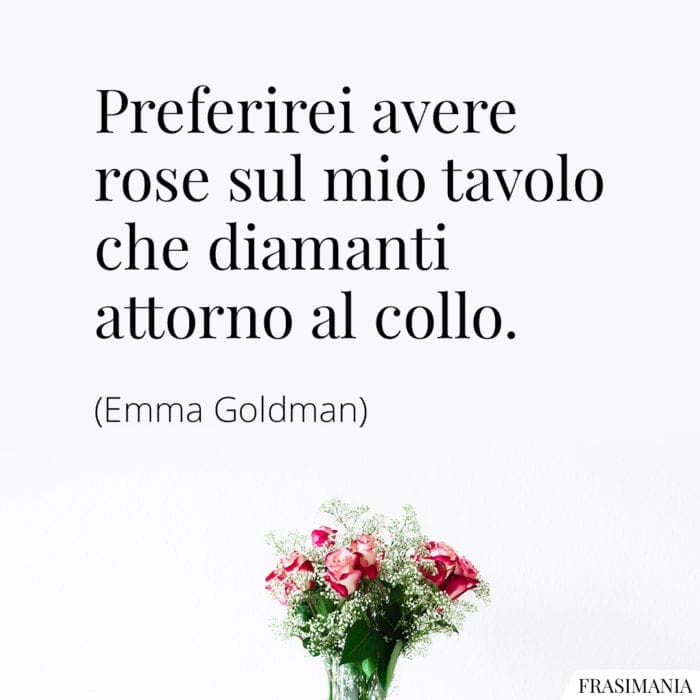
- I feel as if I had opened a book and found roses of yesterday sweet and fragrant, between its leaves.
Mi sento come se avessi aperto un libro e trovato delle rose di ieri dolci e fragranti, tra le sue pagine.
(Lucy Maud Montgomery) - Life is short, and time is swift; Roses fade, and shadows shift.
La vita è breve e il tempo vola; le rose appassiscono e le ombre si spostano.
(Ebenezer Elliot) - An idealist is one who, on noticing that a rose smells better than a cabbage, concludes that it makes a better soup.
Un idealista è uno che, notando che una rosa odora meglio d’un cavolo, ne conclude che se ne possa cavare una zuppa migliore.
(Henry Louis Mencken)







